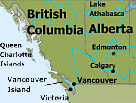Hiring of temporary foreign workers made easier in Western Canada
 Employers in British Columbia and Alberta will be able to hire foreign workers more quickly when there are no Canadian citizens or permanent residents to fill job openings. Instead of processing files in three to five months, Human Resources and Development Canada will now try to process them in three to five days. The Labour Market Opinions—the evaluation of the repercussions of hiring foreign workers on the Canadian labour market—in particular will be expedited. Note, however, that this special treatment only applies to twelve occupations in the construction, tourism and hospitality sectors such as waiter, ski instructor, receptionist, retail sales clerk, etc. This is good news for employers struggling to find employees.
Employers in British Columbia and Alberta will be able to hire foreign workers more quickly when there are no Canadian citizens or permanent residents to fill job openings. Instead of processing files in three to five months, Human Resources and Development Canada will now try to process them in three to five days. The Labour Market Opinions—the evaluation of the repercussions of hiring foreign workers on the Canadian labour market—in particular will be expedited. Note, however, that this special treatment only applies to twelve occupations in the construction, tourism and hospitality sectors such as waiter, ski instructor, receptionist, retail sales clerk, etc. This is good news for employers struggling to find employees.
Jobanimal.com and Jobloft.com acquired by U.S. sites
 In early November, U.S. firm Beyond.com Inc. confirmed its expansion to Canada via the purchase of Jobanimal.com Inc., which has 873,000 registered users and 150 job boards targeted by sector or region in Canada. A few weeks after buying Techcarreers.com, Beyond.com therefore acquired a new network of job boards. This follows on the heels of the acquisition by onTargetJobs, parent company of the Hcareers.com job board, specializing in hotel and hospitality careers. In late October, Hcareers.com acquired Canadian job board Jobloft.com. Launched in 2006, this retail, food services and hospitality jobs site uses Web 2.0 technologies, with a search engine based on Google Maps.
In early November, U.S. firm Beyond.com Inc. confirmed its expansion to Canada via the purchase of Jobanimal.com Inc., which has 873,000 registered users and 150 job boards targeted by sector or region in Canada. A few weeks after buying Techcarreers.com, Beyond.com therefore acquired a new network of job boards. This follows on the heels of the acquisition by onTargetJobs, parent company of the Hcareers.com job board, specializing in hotel and hospitality careers. In late October, Hcareers.com acquired Canadian job board Jobloft.com. Launched in 2006, this retail, food services and hospitality jobs site uses Web 2.0 technologies, with a search engine based on Google Maps.
Increasing number of retirees seeking full-time work
 At least, this is what was reported on the www.retiredworkers.ca portal. . . In mid-October, this Web site specializing in jobs for retirees conducted an online survey to better grasp the profile of its visitors. Over some 15 days, 1,849 50-plus people answered questions about their professional aspirations. The surprising result was that the percentage of older workers looking for full-time, permanent jobs had tripled in one year. In 2007, this group represented 35% of respondents, vs 11% in 2006. According to Retired Worker, how these professionals perceive work—and in turn, how they are perceived by society—is changing. "Older workers are increasingly well accepted in the workplace, and the press is starting to portray them as online boomers rather than senior citizens," says Sarah Welstead, Retired Worker co-founder. The results also show that these "online" baby boomers are far from being as disconnected from new technologies as one would think: 80 % of them have access to high-speed Internet, 88% have their own computer and 5% even have a BlackBerry. These numbers need to be put into context, however, as the survey was conducted online
At least, this is what was reported on the www.retiredworkers.ca portal. . . In mid-October, this Web site specializing in jobs for retirees conducted an online survey to better grasp the profile of its visitors. Over some 15 days, 1,849 50-plus people answered questions about their professional aspirations. The surprising result was that the percentage of older workers looking for full-time, permanent jobs had tripled in one year. In 2007, this group represented 35% of respondents, vs 11% in 2006. According to Retired Worker, how these professionals perceive work—and in turn, how they are perceived by society—is changing. "Older workers are increasingly well accepted in the workplace, and the press is starting to portray them as online boomers rather than senior citizens," says Sarah Welstead, Retired Worker co-founder. The results also show that these "online" baby boomers are far from being as disconnected from new technologies as one would think: 80 % of them have access to high-speed Internet, 88% have their own computer and 5% even have a BlackBerry. These numbers need to be put into context, however, as the survey was conducted online
A more educated Aboriginal population would make for a richer country
 If Aboriginal youth graduated from high school and university in numbers comparable to other Canadian youth, the country's GDP could increase by $62 billion within ten years. This was one of the conclusions of a new study released November 26 by the independent Ottawa-based Centre for the Study of Living Standards. Currently, some 50% of Aboriginal Canadians graduate from high school, compared to nearly 70% of non-Aboriginals. At the university level, the proportion is 8.9% for Aboriginals vs 21.8% for non-Aboriginals. "It is not news that Aboriginal Canadians fall behind other Canadians in terms of rates of completing high school and university,” explains Dr. Andrew Sharpe, Executive Director of the Centre. "What is new is this is the first time that the economic cost—or to put it differently—the potential contribution—has been calculated. The significance of even a small improvement in educational attainment rates is considerable," adds Dr. Sharpe. The report also shows that with better educational completion rates, Canadian Aboriginals would provide up to 7.4% of total labour force growth by 2017, a good thing to know at a time when an increasing number of companies are facing hiring crunches.
If Aboriginal youth graduated from high school and university in numbers comparable to other Canadian youth, the country's GDP could increase by $62 billion within ten years. This was one of the conclusions of a new study released November 26 by the independent Ottawa-based Centre for the Study of Living Standards. Currently, some 50% of Aboriginal Canadians graduate from high school, compared to nearly 70% of non-Aboriginals. At the university level, the proportion is 8.9% for Aboriginals vs 21.8% for non-Aboriginals. "It is not news that Aboriginal Canadians fall behind other Canadians in terms of rates of completing high school and university,” explains Dr. Andrew Sharpe, Executive Director of the Centre. "What is new is this is the first time that the economic cost—or to put it differently—the potential contribution—has been calculated. The significance of even a small improvement in educational attainment rates is considerable," adds Dr. Sharpe. The report also shows that with better educational completion rates, Canadian Aboriginals would provide up to 7.4% of total labour force growth by 2017, a good thing to know at a time when an increasing number of companies are facing hiring crunches.
Immigration: Studying in Canada to find a job
 Canada should focus on young foreign students as a rich source of immigration. This is the recommendation just issued by two professors of the Institute for Research on Public Policy—a non-profit association affiliated with the Université de Montréal—in a study published at the beginning of November. According to the authors, foreigners who complete their education in Canada have a better chance of succeeding in landing a job. Because they have lived in the country for a while, they have acquired the knowledge they need to adapt to the Canadian way of life. The main advantage is that these students will have a Canadian degree and will usually get their first professional experience in Canada. Consequently, the recognition of their degrees and experiences poses less of a problem. Previous studies have shown that many highly qualified immigrants have a great deal of difficulty pursuing careers in their field because their foreign experience and degrees are not recognized here.
Canada should focus on young foreign students as a rich source of immigration. This is the recommendation just issued by two professors of the Institute for Research on Public Policy—a non-profit association affiliated with the Université de Montréal—in a study published at the beginning of November. According to the authors, foreigners who complete their education in Canada have a better chance of succeeding in landing a job. Because they have lived in the country for a while, they have acquired the knowledge they need to adapt to the Canadian way of life. The main advantage is that these students will have a Canadian degree and will usually get their first professional experience in Canada. Consequently, the recognition of their degrees and experiences poses less of a problem. Previous studies have shown that many highly qualified immigrants have a great deal of difficulty pursuing careers in their field because their foreign experience and degrees are not recognized here.
Women PhDs earn less than their male colleagues

In 2001, 80% of science and engineering PhDs were men, and today, women PhDs still earn considerably less than their male counterparts. A recently published Statistics Canada study revealed that for each dollar earned by male PhDs, female PhDs earned 77 cents. Salary inequities between men and women are decidedly not about to go away.
84% of Canadians who quit their job blame it on the boss
 According to a recent Monster.ca online survey, most Canadians who have ever quit a job did so because of a boss who was treating them badly or who ruled through fear and intimidation. Overall, 84% of the 2,687 respondents said that they had quit because of a "bad boss." In detail, the real reasons underlying their departures varied: 32% said that their former boss "did not treat them fairly," 28% considered that their manager "ruled through fear and intimidation," while 24% gave up and quit because of a boss who "did not respect the rights of employees." Only 16% of respondents said that they had quit for reasons not related to their boss.
According to a recent Monster.ca online survey, most Canadians who have ever quit a job did so because of a boss who was treating them badly or who ruled through fear and intimidation. Overall, 84% of the 2,687 respondents said that they had quit because of a "bad boss." In detail, the real reasons underlying their departures varied: 32% said that their former boss "did not treat them fairly," 28% considered that their manager "ruled through fear and intimidation," while 24% gave up and quit because of a boss who "did not respect the rights of employees." Only 16% of respondents said that they had quit for reasons not related to their boss.
Government of Canada launches online recruiting campaign
 In order to promote careers in the public service, Public Works and Government Services Canada has launched a Web site for young job-seekers. With the help of this new multimedia platform, the department hopes to fill 300 job openings. With its job descriptions, candidate tips and video clips, the site remains very traditional. Keep in mind that Public Works and Government Services Canada is the common service agency for the Government of Canada's various departments. Based in Gatineau, Quebec, PWGSC employs 12,000 people.
In order to promote careers in the public service, Public Works and Government Services Canada has launched a Web site for young job-seekers. With the help of this new multimedia platform, the department hopes to fill 300 job openings. With its job descriptions, candidate tips and video clips, the site remains very traditional. Keep in mind that Public Works and Government Services Canada is the common service agency for the Government of Canada's various departments. Based in Gatineau, Quebec, PWGSC employs 12,000 people.
RecruitAd becomes OriginHR Canada
 On December 1, the human resources communication and consulting firm RecruitAd changes its name to « OriginHR Canada ». Created in 1989, this division of CNC Global has offices in Canada’s main cities. Their services : employer branding, recruitment advertising, print communications and online solutions.
On December 1, the human resources communication and consulting firm RecruitAd changes its name to « OriginHR Canada ». Created in 1989, this division of CNC Global has offices in Canada’s main cities. Their services : employer branding, recruitment advertising, print communications and online solutions.